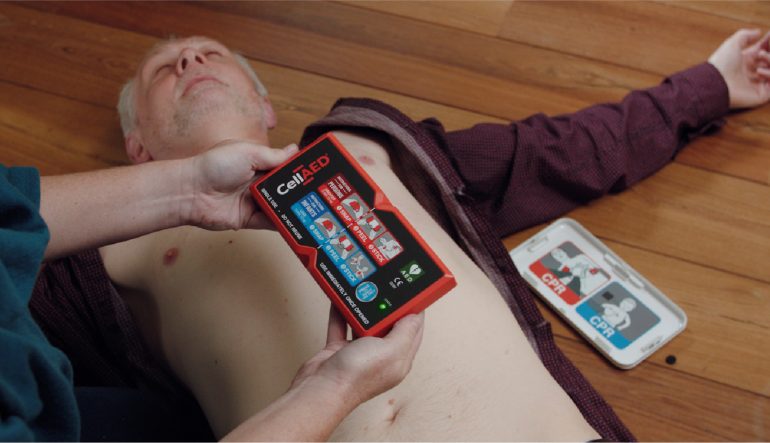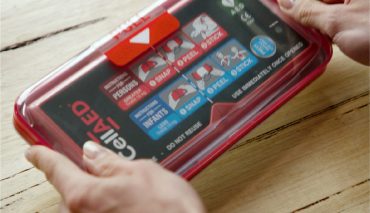CellAED Project 1 Million: EOIs open for large-scale CellAED adoption
Expressions of interest are now open to become one of the first large-scale adopters of the world’s first personal defibrillator, CellAED to help tackle one of the world’s biggest causes of premature death, sudden cardiac arrest.
Rapid Response Revival is seeking expressions of interest to commit to orders of one million or more CellAED devices for delivery from July 2023.
The world’s first personal defibrillator for the home, CellAED
CellAED (pictured) is the first regulatory-approved, unique, miniaturised automated external defibrillator, or AED.
AEDs give people who have experienced sudden cardiac arrest their best chances of survival – but until now, AEDs have been too costly and cumbersome to ensure they are available when and where they’re needed.
CellAED represents an unprecedented opportunity to boost public access to defibrillation, and get AEDs (automated external defibrillators) into homes – where most sudden cardiac arrests occur.
At a fraction of the cost of existing AEDs, with no replacement parts, and being similar in size and weight to a block of chocolate, CellAED represents a quantum leap forward for AEDs. Its low cost and portability enable up to ten-times the number of CellAEDs to be deployed at a similar cost to maintaining an existing AED network.
In addition to being the world’s first personal defibrillator, CellAED is also the first AED to secure RED Certification for its IoT (Internet of Things) capabilities. CellAED is unique in that it is always connected while in range of any cellular signal, and is remote monitored to ensure continued readiness for use in an emergency. It is also designed to integrate easily with existing emergency services and first responder infrastructure, improving speed and quality of response when used to help save a life from sudden cardiac arrest.
Current regulatory approvals for CellAED have been secured for the member states of the European Economic Area, the UK, Australia and New Zealand. Additional major jurisdictional regulatory assessments are underway, and anticipated to coincide with the scaling of CellAED manufacturing from late 2022.
CellAED Project 1 Million
Rapid Response Revival has undertaken to identify opportunities to supply major projects pioneering the adoption of personal defibrillation over the next two to three years, with orders of one million or more devices.
As part of this search, Rapid Response Revival is seeking a partner that recognises the opportunity CellAED represents, to establish an unprecedented network of personal defibrillators that significantly empowers people in workplaces, communities and homes to respond to sudden cardiac arrest emergencies.
CellAED was designed to better serve these communities, for whom existing public access defibrillator networks are inadequate when it comes to improving chances of survival. In partnering with Rapid Response Revival, an initial large-scale adopter would recognise the need to improve access to defibrillation in their communities, and see in CellAED an affordable, adaptable opportunity to address these problems quickly.
Such partners could be government, non-government organisations or private enterprises that recognise the opportunity, and see the value in acting now, to take advantage of this new technology.
“The arrival of CellAED heralds a transition from public access defibrillation, to personal access defibrillation. It is the first AED that is affordable for households; that can be applied in seconds with its proprietary Snap Peel Stick design; and is small enough to fit into the palm of your hand,” said Rapid Response Revival co-founder and CEO, Donovan Casey.
“These breakthroughs address the biggest barriers to improving access to defibrillation: cost, ease of use, and accessibility. We’re looking for partners who recognise what these breakthroughs mean for their ability to improve chances of surviving sudden cardiac arrest, and are motivated to act.”
Saving lives from sudden cardiac arrest
Rapid Response Revival is currently fielding enquiries from governments, international concerns and private individuals considering early large-scale adoption.
Their common motivation is taking the opportunity CellAED represents to improve public, personal and home access to defibrillation.
Sudden cardiac arrest is one of the world’s biggest causes of premature death, killing between 7 and 9 million people annually.
Globally, the sudden cardiac arrest survival rate is less than one per cent. This is because sudden cardiac arrest kills quickly; for every minute without treatment following an event, the chances of survival decrease by 7-10 per cent.
The most effective way to treat a patient in sudden cardiac arrest is with a defibrillator. Around 80 per cent of out-of-hospital cardiac arrests occur in homes – and yet current defibrillators are too costly, and too inaccessible to be a realistic option for availability in households.
CellAED overcomes those barriers, and represents the first real opportunity to make defibrillation available to people who are at risk of sudden cardiac arrest. Not only does CellAED provide an affordable tool, it also delivers the foundation for people to learn more about sudden cardiac arrest, and adopt the awareness and skills they need to save lives.
The first step in responding to Rapid Response Revival’s call for expressions of interest, is to email the team at [email protected] with a brief description of why this project appeals to you.



